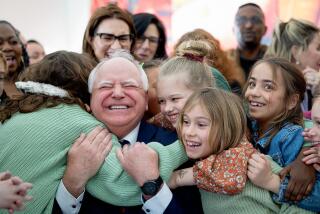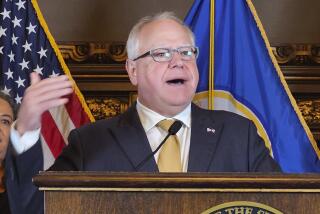Jackson Asks for Offer of VP Spot : Little Chance Seen That He Will Be Chosen
- Share via
WASHINGTON — Despite the verbal sparring between Democratic presidential candidates Michael S. Dukakis and the Rev. Jesse Jackson over the vice presidency, advisers in both camps said Wednesday that there is little or no chance that Dukakis will choose Jackson as his running mate.
Jackson himself, who insisted that he has earned the right to be offered the second spot on a ticket headed by Dukakis, is just as aware of this as Dukakis, advisers to both candidates said. Their public debate, these aides said, is designed mainly to appease Jackson’s more passionate supporters, who insist that he should be the running mate because of his strong showing in the primaries.
Compromise Sought
Advisers to both Jackson and Dukakis worked Wednesday behind the scenes to reach a compromise on the running-mate question and other issues in hopes of unifying Democrats for the fall election.
A compromise could include support by Dukakis for Jackson’s policy positions on some issues and a leading role for Jackson in the Democratic convention in Atlanta next month, they said. Dukakis also might support Jackson’s proposal for reforming the Democratic delegate-selection process.
“We’ve got to work hard to make it happen, and it’s premature to think we’re anywhere close, but already the basic elements are emerging,” Ron Brown, Jackson’s director for the Democratic convention, said in an interview. “The basic direction involves platform positions and reform of the delegation-selection process.”
Dukakis aides and party officials firmly oppose putting Jackson on the ticket for fear that his presence would doom Dukakis’ chances of defeating Vice President George Bush, who has cinched the Republican nomination, in November.
At the same time, Jackson’s strong showing in the primaries and his hold on the black electorate make the running-mate question a sensitive one for Dukakis. The Massachusetts governor, aware that Jackson accused Walter F. Mondale, the 1984 Democratic presidential nominee, of ignoring him during the process of selecting a running mate, has consistently said he would consider Jackson.
Brown, one of Jackson’s more moderate advisers and a former deputy chairman of the Democratic National Committee, said communication lines between the two political camps are open “and everybody’s saying the right things.” But he cautioned that there are sharp differences between the two candidates on some issues, and “you can never be sure of reaching an accommodation before you walk down that road.”
Accommodation Seen
Leading Democrats, including party Chairman Paul G. Kirk Jr., say they are convinced that a Dukakis-Jackson accommodation will be worked out.
Kirk, who commended Jackson by telephone on Wednesday for “setting a good tone in the campaign,” said: “First of all, throughout the campaign both candidates have struck a positive, constructive tone. There’s been no sense of antagonism. Both candidates understand the importance of winning in November.”
Dukakis himself, apparently determined to avoid a mistake that plagued the Mondale campaign, has moved quickly to reach an accommodation with Jackson. He met with him for 90 minutes in Los Angeles on the eve of Tuesday’s California primary, for example.
Reconciling Differences
Richard Moe, a key Mondale campaign adviser who now is advising Dukakis, especially on selecting a running mate, conceded that it will be difficult to reconcile all of the differences between Jackson and Dukakis. But he added: “Ultimately they’re going to get together because Jesse has always said his goal this year is to elect a Democratic President, and I don’t doubt that.”
What Jackson has achieved, said Moe, “is historic, and he’s going to be a leading Democratic figure for a long time to come. That will only be enhanced if we win, and he’ll have a significant role to play one way or another. But that can happen only if we win.”
After Mondale won the Democratic presidential nomination in 1984, his campaign conducted long, drawn-out negotiations with Jackson that resulted in a spate of headlines stressing their differences and the concessions Jackson managed to extract. Mondale has privately acknowledged the exercise was one of the worst mistakes of his campaign, leaving an impression that Mondale was weak.
Dukakis Will Negotiate
“That won’t happen this time,” a campaign adviser to the governor said. “And Dukakis will do his own negotiating, he won’t leave it to the campaign.”
Jackson’s reasons for publicly raising the vice presidential issue on Wednesday, the day after Dukakis’ victories in the California, New Jersey, New Mexico and Montana primaries all but guaranteed him the nomination, could involve bargaining strategy as well as playing to the concerns of his more ideological followers.
“I suppose he’s escalating it in order to assure that he’ll get some other things he’s looking for,” one Jackson adviser suggested. “That was a bargaining technique he used to use in Chicago as a civil rights leader. He’d make some demands of the mayor, and when they were rejected, he’d say: ‘OK, but now you’ve got to give me so and so.’ ”
Moderate Advisers
While Jackson’s more moderate advisers have played down the running-mate issue, Ron Brown said: “Don’t underestimate the degree to which a lot of Jackson supporters feel strongly that he deserves serious consideration and a lot feel even more strongly he ought to have it.”
Not only is Dukakis not expected to offer Jackson a spot on the ticket, his aides say he probably will not offer Jackson a veto of his choice for a running mate. But the likely Dukakis-Jackson meetings in coming weeks could serve as a substitute by giving Jackson a chance to make clear in advance whether he approved of a prospective running mate.
Jackson has been receiving conflicting advice recently. His more ideological aides, including political director Frank Watkins, Delegate Walter E. Fauntroy of the District of Columbia and Assemblywoman Maxine Waters of Los Angeles, have encouraged him to seek the expanded influence they believe he has earned. Others, including Brown, Bert Lance and John White, have been counseling caution.
Closed-Door Negotiations
Lance, a leading Georgia Democrat who served briefly as budget director for President Jimmy Carter, and White, a former Democratic Party chairman, agree with Brown that the outlines of a Jackson-Dukakis accommodation are emerging from closed-door negotiations. But they, too, caution that the two candidates are far from settling their differences.
Some Democrats say Jackson’s negotiations with some of his more militant advisers may prove tougher than his dealings with Dukakis.
“Jackson wants to reach an accommodation with Dukakis, but his biggest problem will be with some of his own people,” said Robert G. Beckel, a Washington political consultant who served as Mondale’s campaign manager and negotiated with Jackson during the 1984 election campaign. “He’ll do more negotiating with his own people than with Dukakis because that’s where the pressure’s coming from.”
Allocation of Delegates
Jackson has served notice that he will challenge party rules governing allocation among the presidential candidates of the “super delegates”--elected officials who are delegates to the party convention by virtue of their office. He plans to argue that the super delegates, now disproportionately in Dukakis’ camp, should be allocated according to the candidates’ popular vote in the primaries.
Staff writers Douglas Jehl and David Lauter contributed to this story.
THE DEMOCRATIC DELEGATE COUNT 2,081 delegates needed to secure nomination Dukakis: 2,291 Jackson: 1,123 Uncommitted: 452 Gore: 290 Others: 5 Source: Associated Press
More to Read
Get the L.A. Times Politics newsletter
Deeply reported insights into legislation, politics and policy from Sacramento, Washington and beyond. In your inbox twice per week.
You may occasionally receive promotional content from the Los Angeles Times.







